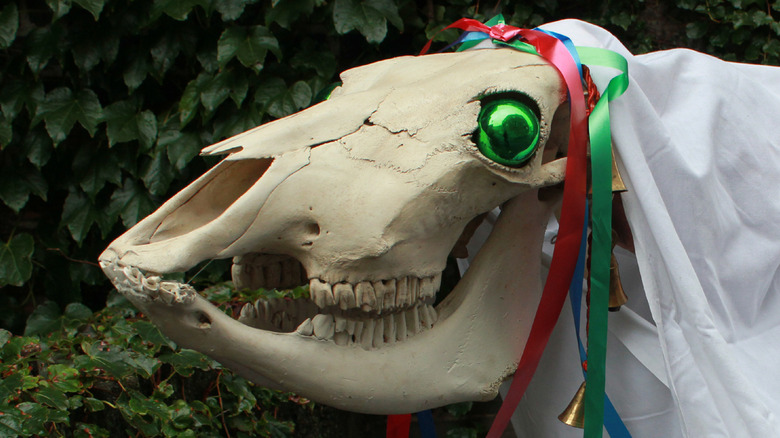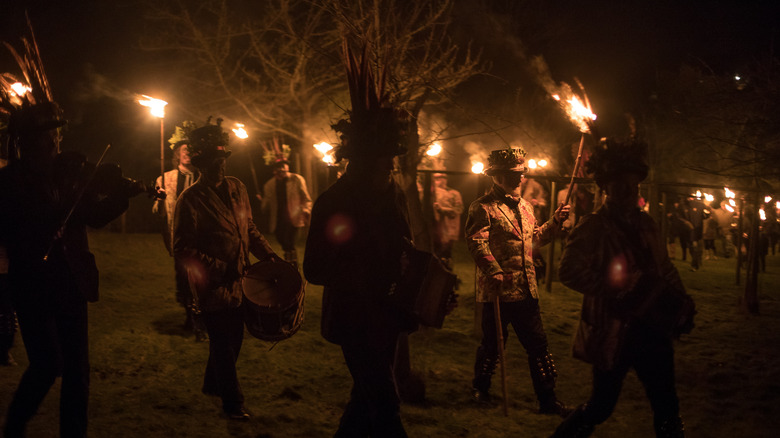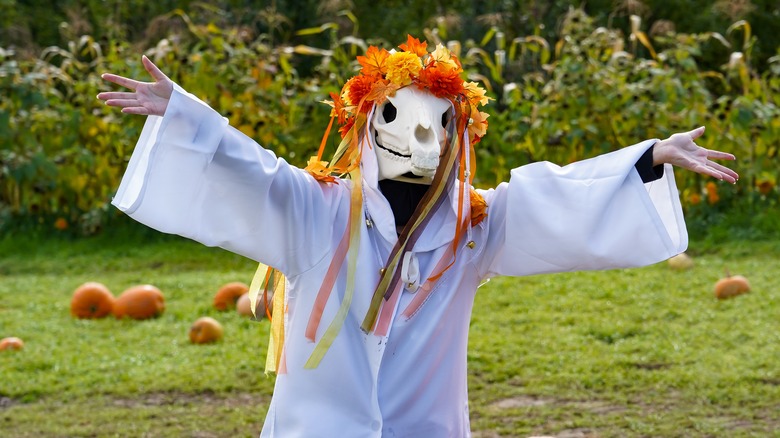This Welsh Christmas Tradition Is Truly Chilling
Christmas is often about showing goodwill to all; for many, it's about celebrating the birth of Jesus Christ. If you're Welsh, it's also about terrifying small children with ghostly dead horses. The Mari Lwyd, or grey mare in Welsh, is a ghoulish horse with mysterious origins that haunts the villages of rural Wales during Christmas and the New Year (via Wales).
Nobody knows why it started or what the point is anymore, but that's just par for the course with some European Christmas traditions. Many strange monsters — such as the German Krampus — are associated with winter festivals in Europe, creatures that remind us winter is also a time of death and darkness, not just a time of light and cheer (via the BBC). In Wales this means carting out the Mari Lwyd, traditionally constructed using a pole, a white sheet, and a horse's skull. The grim horse is often covered in festive decorations such as baubles and Christmas lights, and revelers carry it around town, knocking on doors and singing — sort of like carolers, but much, much creepier.
Once the ghostly visitors have finished their song, they often also challenge the local inhabitants to sing in return, or else engage in a pwnco – a rhyming competition. The implicit threat being that if you do not defeat the Mari Lwyd with your wits, the ghostly creature will enter your abode and attack you (via Museums Wales).
But, why?
While it all sounds quite sinister, the Mari Lwyd brings good luck, food, and alcoholic beverages wherever it goes, and the procession is conducted in the spirit of good cheer. The men and women who accompany the Mari Lwyd often dress in brightly colored costumes, styling themselves as jesters or Punch and Judy characters (via Museums Wales). The tradition is thought to be connected to the broader tradition of wassailing, an ancient celebration carried out across the British Isles during the winter in order to greet the new year in a merry fashion. Wassailing usually involves singing and dressing up, and always involves drinking.
According to Historic UK, the phrase "Waes hael" is a toast to good health in old Anglo-Saxon.The celebration is sometimes conducted in the presence of apple trees, from which precious hard cider is made, and the tradition of door-to-door singing helped to create caroling. The words of the traditional Mari Lwyd song make reference to the joyful indulgence of wassailing processions: "O, tap the barrel / And let it flow freely / Don't share it meanly!" (via Museums Wales).
It is unknown why the Welsh version of the wassail involves a dead horse, but many people assume it was once meaningful to ancient pagans. Pale horses in the U.K. are intimately connected to Celtic mythology and can pass over to the land of the dead (via Wales).
How does this fit in with Christianity?
The earliest written accounts we have about the Mari Lwyd are quite late, dating to just 1798 (via Museums Wales). The celebration became extremely popular during the 19th century, a time when Britain and many other European countries had just gone through a folklore revival, thanks to the Romantic movement.
Perhaps it's no surprise that not everyone has always been wild about the Mari Lwyd, which to some sounds like a nightmarish practice from "The Wicker Man" (via Wales). Many Methodists in Wales historically disapproved of the drunken revelry that accompanied the Mari Lwyd, and we know a lot about the 19th century tradition thanks to the withering critique of a Welsh Baptist pastor, Reverend William Roberts, who wrote a damning book about local pre-Christian religious traditions.
On the other hand, like many other pre-Christian revels, the Mari Lwyd has also been awarded a Christian backstory. According to legend, the ghoulish mare, pregnant, was displaced from its stable by Mary and Joseph, and it is still looking for a new home today.


